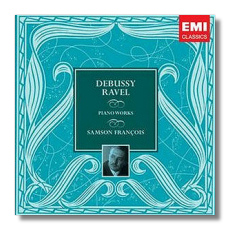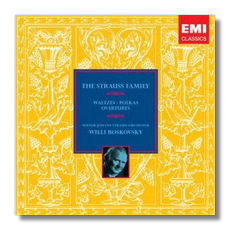
The Internet's Premier Classical Music Source
Related Links
- Latest Reviews
- More Reviews
-
By Composer
-
Collections
DVD & Blu-ray
Books
Concert Reviews
Articles/Interviews
Software
Audio
Search Amazon
Recommended Links
Site News
 CD Review
CD Review
EMI Classics

- Claude Debussy:
- Préludes (Books I and II)
- Images
- Rêverie
- Deux Arabesques
- La plus que lente
- Études (Book II)
- Masques
- L'Isle joyeuse
- Berceuse héroïque
- Children's Corner
- Estampes
- Suite bergamasque
- Pour le piano
- Maurice Ravel:
- Piano Concerto in G Major *
- Concerto for the Left Hand *
- Ma Mère l'Oye
- Pavane for a dead princess
- Valses nobles et sentimentales
- Prélude
- Jeux d'eau
- Menuet sur le nom d'Haydn
- Miroirs
- A la manière de Chabrier
- A la manière de Borodine
- Gaspard de la nuit
- Sonatine
- Le Tombeau de Couperin
- Menuet antique
Samson François, piano (with Pierre Barbizet)
* Orchestre de la Société des Concerts du Conservatoire/André Cluytens
EMI Classics 5 85990 2 ADD 6CDs: 72:23, 75:23, 57:47, 52:11, 63:12, 64:25


The Strauss Family
Waltzes, Polkas, and Overtures
(See complete work listing at end of review)
Vienna Johann Strauss Orchestra/Willi Boskovsky
Vienna Symphony Orchestra/Willi Boskovsky
Munich Radio Orchestra/Willi Boskovsky
EMI Classics 5 86019 2 DDD/ADD 6CDs: 70:14, 73:50, 70:59, 70:04, 68:49, 63:23
The François set contains almost the complete solo piano music of Debussy and Ravel, plus bonuses, such as Ravel's two piano concertos and Mother Goose, which was written for piano, four-hands. More than three decades after his death in 1970, François remains a controversial pianist, loved by some and reviled by others. Especially later in his career, he was not the most consistent of musicians, and he could be rather cavalier in his interpretations. While still a student in the Conservatoire, he moved his teacher, the usually unflappable Marguerite Long, to slap him. Towards the end of his life (he died at the pitifully young age of 46), when good times had weakened his heart, he lay in his hospital bed smoking cigars and drinking alcohol. In the end, this Samson sheared off his own hair, although the adoration he received, particularly in France, certainly did its part to hand him the scissors.
These recordings were made between 1959 and 1970 – most of them during the last four years of that period. By many accounts, François was in decline as early as the mid-1960s, and so it might be supposed that these performances are less than ideal. Certainly, François was among the coolest pianists (not in the jazz sense!) to record this music, and his interpretations can be so aristocratic as to merit the adjective "haughty." He can be wayward and offhand. Take, for example, the first of the Deux Arabesques, which almost reeks with condescension. (Yes, this isn't Debussy's best piano work, but still… !) Sometimes the music's technical demands aren't even fully realized. For the most part, though, François's playing is remarkable for its bejeweled precision and restraint. And then there's that imagination. Try the Forlane from Le Tombeau de Couperin, and you'll hear a little of the other side of François: the pianist who loved jazz, and who stayed up when most of the world was asleep.
Cluytens conducts knowledgeably in the two Ravel concertos, and pianist Pierre Barbizet is a worthy ally in Mother Goose. The sound quality is a little on the dry side, but the intimacy is welcome. At the tiny asking price, these six discs are a steal. He might frustrate you at times, but give Samson François a try!
Although earlier in his career he was more familiar as a violinist (his recordings from the 1950s of Mozart's Violin Sonatas with pianist Lili Kraus continue to be treasures), Willi Boskovsky's name has been synonymous with the Strauss family for decades. While he didn't record everything written by Johann Strauss I and II, Josef Strauss, and Eduard Strauss, he came closer to doing so than just about any other conductor. His interpretations are authentic, affectionate, and completely without any kind of mannerisms.
Boskovsky was a remarkable musician. At the age of 25 he was teaching at the Vienna Academy, and five years later, he was named concertmaster of the Vienna Philharmonic. (He remained in that position until 1960.) It was at the dawn of the stereo era when he began to be a renowned conductor of the music of Johann Strauss II and his family. He made a number of recordings for Decca in the 1950s and 60s, and in the 1970s, he made additional recordings for EMI Classics.
As a result, it's Boskovsky versus Boskovsky, because Decca released its own 6-CD box of music by the Strausses conducted by Boskovsky in 1997 (455254-2). Those recordings, made between 1958 and 1976, all feature the Vienna Philharmonic. (It doesn't get much plusher than that.) This new set from EMI Classics includes recordings of a more recent vintage, for the most part, and features two of Vienna's "other" orchestras, plus a chunk of material from the fine German broadcast orchestra based in Munich. Both sets are very inexpensive, and so it is tempting to suggest purchasing both of them, even though there is naturally quite a bit of duplicated repertoire. For those who care about such things, most of the selections in the EMI Classics box are digital; everything in the Decca box is analogue (but in excellent sound). Boskovsky's later performances are not significantly different. If anything, they are a little more relaxed, and the sound of the orchestras, if not as rich as that of the Vienna Philharmonic, has more sinew. In the waltzes, I prefer the Decca recordings, but in the polkas, I prefer the EMI. I could be happy with either set, however. Fortunately, I don't have to choose! Either way, here's an excellent way of building in "instant Strauss" collection. Even the booklet notes are decent.
Copyright © 2005, Raymond Tuttle.
- Johann Strauss Sr.:
- Radetzky March, Op. 228
- Seufzer-Galopp, Op. 9
- Johann Strauss Jr.:
- An der schönen, blauen Donau, Op. 314
- Künstlerleben, Op. 316
- Geschichten aus dem Wienerwald, Op. 325
- Wein, Weib und Gesang, Op. 333
- Wiener Blut, Op. 354
- Das Spitzentuch der Königin: Rosen aus dem Süden Waltzes, Op. 388
- Frühlingsstimmen, Op. 410
- Kaiser-Walzer, Op. 437
- Feuilleton, Op. 293
- Gedankenflug, Op. 215
- Accelerationen, Op. 234
- Immer heiterer, Op. 235
- Carnevals-Botschafter, Op. 270
- Leitartikel, Op. 273
- Morgenblätter, Op. 279
- Flugschriften, Op. 300
- Neu-Wien, Op. 342
- Der Carneval in Rom: Carnevalsbilder, Op. 357
- Wo die Zitronen blühn, Op. 364
- Die Fledermaus: Du und Du, Op. 367
- Der lustige Krieg: Kuss-Walzer, Op. 400
- Eine Nacht in Venedig: Lagunen-Walzer, Op. 411
- Der Zigeunerbaron: Schatz-Walzer, Op. 418
- Wiener Frauen, Op. 423
- Simplicius: Donauweibchen, Op. 427
- Explosions-Polka, Op. 43
- Champagner-Polka, Op. 211
- Maskenzug-Polka, Op. 240
- Episode, Op. 296
- Kreuzfidel Polka, Op. 301
- Express-Polka, Op. 311
- Leichtes Blut, Op. 319
- Unter Donner und Blitz, Op. 324
- Eljen a Magyar, Op. 332
- Im Krapfenwaldl, Op. 336
- Indigo und die vierzig Räuber: Im Sturmschritt, Op. 348
- Der Carneval in Rom: Vom Donaustrande, Op. 356
- Der Carneval in Rom: Gruss aus Österreich Polka, Op. 359
- Cagliostro in Wien: Auf der Jagd Polka, Op. 373
- Prinz Methusalem: I Tipferl, Op. 377
- Prinz Methusalem: Banditen-Galopp, Op. 378
- Fürstin Ninetta: Neue Pizzicato-Polka, Op. 449
- Der Carneval in Rom: Overture
- Die Fledermaus: Overture
- Cagliostro in Wien: Overture
- Blindekuh: Overture
- Das Spitzentuch der Königin: Overture
- Eine Nacht in Venedig: Overture
- Der Zigeunerbaron: Overture
- Josef Strauss:
- Perlen der Liebe, Op. 39
- Dorfschwalben aus Österreich, Op. 164
- Geheime Anziehungskräfte, Op. 173
- Delirien, Op. 212
- Aquarellen, Op. 258
- Mein Lebenslauf ist Lieb und Lust, Op. 263
- Masken, Op. 33
- Vorwärts, Op. 127
- Auf Ferienreisen, Op. 133
- Die Schwätzerin, Op. 144
- Frauenherz, Op. 166
- Sport, Op. 170
- Allerlei, Op. 219
- Im Fluge, Op. 230
- Plappermäulchen, Op. 245
- Buchstaben-Polka, Op. 252
- Feuerfest, Op. 269
- Ohne Sorgen, Op. 271
- Künstler-Gruss, Op. 274
- Jokey-Polka, Op. 278
- Eduard Strauss:
- Bahn frei, Op. 45
- Wo man lacht und lebt, Op. 108
- Ohne Aufenthalt, Op. 112
- Unter der Enns, Op. 121
- Alpenrose, Op. 127
- Reiselust, Op. 166
- Ausser Rand und Band, Op. 168bis
- Faschingsbrief, Op. 203
- Mit Vergnügen!, Op. 228
- Ohne Bremse, Op. 238



















